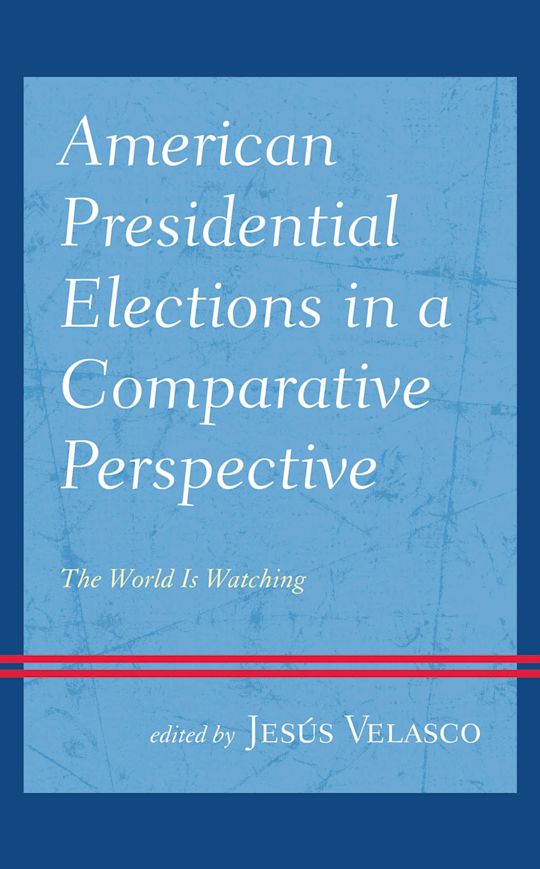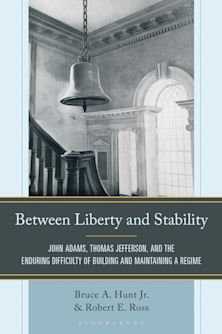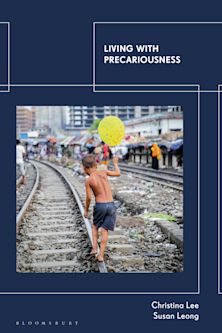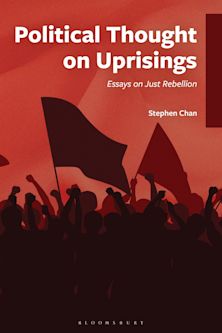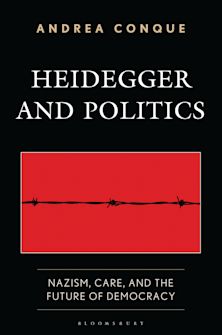- Home
- ACADEMIC
- Politics & International Relations
- Political Theory and Philosophy
- American Presidential Elections in a Comparative Perspective
American Presidential Elections in a Comparative Perspective
The World Is Watching
Jesús Velasco (Anthology Editor) , Zhang Guoxi (Contributor) , Hidematsu Hiyosh (Contributor) , Anna Kronlund (Contributor) , Alex Soohoon Lee (Contributor) , Luis Maira (Contributor) , Guilherme Santos Mello (Contributor) , Reginaldo Moraes (Contributor) , Young Hwan Park (Contributor) , Varun Sahni (Contributor) , Jungkun Seo (Contributor) , Devika Sharma (Contributor) , Eric Shiraev (Contributor) , Jesús Velasco (Contributor) , François Vergniolle de Chantal (Contributor) , Oscar Vidarte (Contributor) , Clive Webb (Contributor)
American Presidential Elections in a Comparative Perspective
The World Is Watching
Jesús Velasco (Anthology Editor) , Zhang Guoxi (Contributor) , Hidematsu Hiyosh (Contributor) , Anna Kronlund (Contributor) , Alex Soohoon Lee (Contributor) , Luis Maira (Contributor) , Guilherme Santos Mello (Contributor) , Reginaldo Moraes (Contributor) , Young Hwan Park (Contributor) , Varun Sahni (Contributor) , Jungkun Seo (Contributor) , Devika Sharma (Contributor) , Eric Shiraev (Contributor) , Jesús Velasco (Contributor) , François Vergniolle de Chantal (Contributor) , Oscar Vidarte (Contributor) , Clive Webb (Contributor)
This product is usually dispatched within 1 week
- Delivery and returns info
-
Free US delivery on orders $35 or over
You must sign in to add this item to your wishlist. Please sign in or create an account
Description
This book studies the views from countries in Asia, Europe, and Latin American of the United States and the 2016 presidential election. Twelve keen observers of the American political scene from three continents evaluate how these perspectives were modified or reinforced as a result of the campaign and election of Donald Trump. This is a book about how foreigners view American politics and will be of interest to students of foreign policy, international studies, history, and political science.
Table of Contents
Zhang Guoxi
Ch. 2 “Trump’s Triumph Through Indian Eyes: Terribly Tragic, Truly Transformative or Totally Trivial?”
Devika Sharma and Varun Sahni
Ch. 3“A Close Look at Changes in Japan-US Relations: The 2016 US Presidential Election as an Example”
Hidematsu Hiyoshi
Ch. 4 “South Korea and the 2016 US Presidential Elections: A Security-Trade Nexus Redefined?”
Jungkun Seo, Young Hwan Park, and Alex Soohoon Lee
Ch. 5 “Straining Vows: Britain, the Election of Donald Trump, and the Special Relationship”
Clive Webb
Ch. 6 “A View of Finnish-U.S. Relations: Past, Present, and Future”
Anna Kronlund
Ch. 7 “‘America the Nightmare. Soon on your screen. Frightful Release Expected in 2017’: French Views of the 2016 Presidential Elections in the US”
François Vergniolle de Chantal
Ch. 8“‘Looking forward…. Maybe’: The 2016 United States’ Presidential Elections from Russia’s Standpoint”
Eric Shiraev
Ch. 9“A Brazilian View of U.S. Political Dynamics”
Guilherme Santos Mello and Reginaldo Moraes
Ch. 10 “The 2016 American Presidential Election in Chile”
Luis Maira
Ch. 11 “Mexican Views of the US and of the 2016 Presidential Election”
Jesus Velasco
Ch. 12 “Peru and Its Perspectives on the United States: An Approach to the Trump Era”
Oscar Vidate A.
Ch. 13“Final Thoughts”
Jesus Velasco
Product details
| Published | Jun 04 2019 |
|---|---|
| Format | Hardback |
| Edition | 1st |
| Extent | 472 |
| ISBN | 9781498557573 |
| Imprint | Lexington Books |
| Illustrations | 9 b/w illustrations; 21 tables |
| Dimensions | 9 x 6 inches |
| Publisher | Bloomsbury Publishing |
About the contributors
Reviews
-
Though the U.S. has been a dominant world power since WWII, many of its citizens, even of its academic community, remain quite parochial. Jesus Velasco’s valuable collection, American Presidential Elections in Comparative Perspective: The World is Watching, asks how the U.S. has been viewed around the world and how has Donald Trump’s election impacted those views. Soberingly, a dozen scholars from the leading nations of Asia, Europe, and Latin America argue that concerns about U.S. insularity, inequality, and democratic decline have been confirmed and deepened by Trump’s election and early conduct in office. This book is critical but uncomfortable reading.
Cal Jillson, Southern Methodist University
-
Since deTocquville, foreign observers have played an important role in helping America understand itself. In this volume, Jesus Velasco has assembled a stellar group of scholars from around the world to comment on America’s recent presidential elections. Americans will have much to learn about themselves through the eyes of these astute students of American politics.
Benjamin Ginsberg, Bernstein Professor of Political Science, Johns Hopkins University
-
This excellent edited volume brings together a series of highly informative, well written and insightful chapters from authors drawn from the major countries of Asia, Europe and Latin America that focus on international perceptions (good, bad, and ugly) of the U.S. role in the world since the 2016 election of President Donald J. Trump. It provides an extremely useful corrective to the usual American assumption that the United States is always seen to be the “good guy” fighting the “good fight” around the globe. The actual picture that emerges from these essays is a much more complex and contradictory one that should be required reading for every American interested in world affairs.
Bruce M. Bagley, University of Miami
-
The world is watching. This volume shows how foreign views of the US electoral process respond to each country’s historical relations with the US and to its strategic and economic interests. More impressively, it also shows that government-to-government views are not the whole story. Connected by broadcast and social media, sophisticated mass publics around the world now react in real time to the spectacle of American democracy. And their nearly unanimous reaction to Donald Trump has been one of bewilderment, apprehension, and disgust. As the book concludes, this has dire implications for US influence--and for democracy—globally.
James E. Mahon Jr., Williams College









